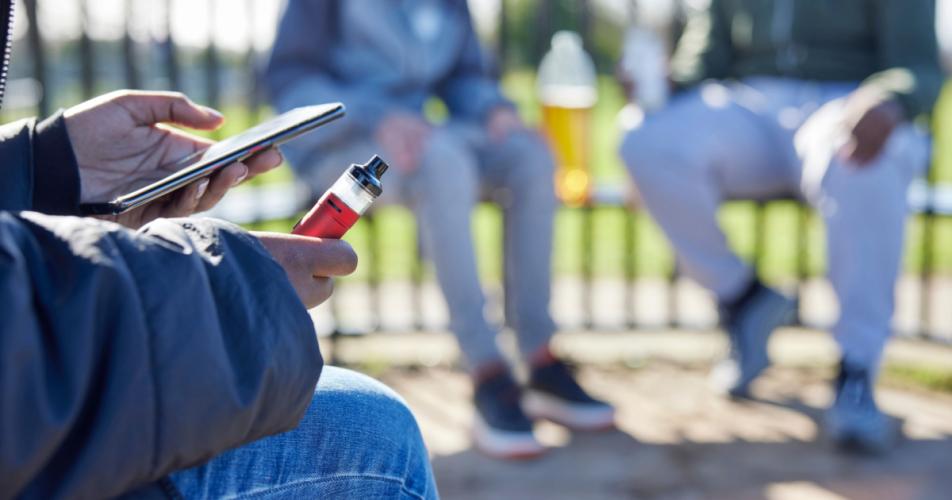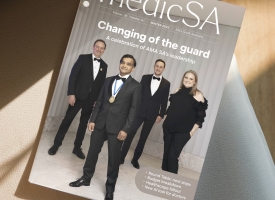Transcript - Vaping report shows dangers
A new report into the contents of vapes confirms what we already knew - you can never know exactly what you're inhaling, AMA Queensland President Dr Maria Boulton has told 4BC.

Transcript: AMA Queensland President, Dr Maria Boulton, 4BC, Weekends with Spencer Howson, Saturday 27 May 2023
Subject: Vaping
SPENCER HOWSON: New tests of vapes have found a toxic cocktail of chemicals. The tests were ordered by the premier after an increase in availability and popularity of flavoured vapes. The Australian Medical Association, when the inquiry was announced, said, "Look, we already know what's in vapes. We don't need another inquiry." The vapes tested by Queensland Health found that they all contain nicotine, which is illegal when they're not prescribed, basically. So they should not have nicotine in, and they've got up to 47,000 milligrams per kilo. So in other words, a 5ml e-cigarette has approximately the equivalent of six packets of cigarettes. Dr Maria Boulton is the President of the Australian Medical Association in Queensland. Maria, good morning once again. So have we learnt anything today?
DR MARIA BOULTON: No. We already knew from studies done previously that, really, we don't really know what's in vapes. But in previous studies they found that vapes contain all those harmful substances, things that are used in paint strippers, nail varnish remover. Also, there was another study done previously that showed that one vape contained the same nicotine as 50 cigarettes. So this is not new to us. We know that they're harmful. And I guess now we just need to get on with the job of reducing the access that our children have to these dangerous substances.
SPENCER HOWSON: I'm amazed that they did it so quickly, to be honest. I mean, Queensland Health can take its time, as we know, analysing results.
DR MARIA BOULTON: And I wasn't expecting this result, but I'm glad they did it. Whatever they need to convince the regulators and the lawmakers to ensure that we do something about vaping, whatever they need to do to convince themselves, I'm happy for. But the reality is that every day that we wait, our children and our adolescents are still having access to vapes. And we know that vapes are not only harmful in themselves, but they also are a gateway drug to smoking and people that vape are three times more likely to become cigarette smokers.
SPENCER HOWSON: And we talked about this. You and I talked about this probably at exactly this time on the program on the day that this inquiry was announced, and I raised with you, I mentioned to you a friend of mine who has used vaping to get off cigarettes. And we had a caller, Michael, who phoned up to say exactly the same thing, that it was the only way that he could get off cigarettes. And I think at the time you said that that was a completely different circumstance to teenagers being sucked into watermelon and strawberry-flavoured vapes as a sort of entry drug. So how do we balance this? Rather than just absolutely outlawing vapes and vaping, which clearly can have its benefits and its uses, how do we actually go forward with this, do you think?
DR MARIA BOULTON: The way that the federal government is tackling it is that they are planning to make vapes a script-only medication that people who genuinely are trying to quit cigarette smoking will continue to have access to. I'm a GP and I see this all the time, and vapes are not the first or the second line of defence when we're talking to someone about smoking cessation. So that will still be available. But also, we need to ensure that people who are hooked on cigarettes or vapes can have access to their GP to that long consultation rebate so that they can actually discuss ways to help them quit cigarette smoking and vaping. And I mean, without that, what's the point, right? Because otherwise people will find it very, very hard to quit.
I know that a lot of people will try multiple times before they are successful, but it's definitely worth it. And the benefits are incredible. I think once people stop smoking and vaping, their sense of smell, their sense of taste starts coming back. All those harmful effects go away. They start bringing up all this terrible stuff that they've been smoking into their lungs. They find that they actually develop a cough and they just cough up all that stuff that's been sitting there. And we need to do everything possible to help people like your caller and your friend.
SPENCER HOWSON: Susan has just texted in to say the sale and use of vapes is completely banned in Singapore. As usual, we're slow to get it. Every week I seem to spot another new vape shop. There are a lot of them. Have you got any sense how strong that industry is? I'm just wondering what their fightback is going to be like, whether they're all just one-off small businesses, or are they a well collected and organised industry?
DR MARIA BOULTON: I think it's a bit of both. And I know that the tobacco industry sparks the vaping industry as well because of vaping being that gateway drug to smoking. And certainly they're a very powerful lobby. But you know what, so are parents as well.
So I think the results are in, and really we don't need any more information to tell us that these substances are dangerous. And in fact, they're so dangerous that if you have a toddler who gets access to a vape and ingests the liquid in the vape, they can actually die from that. That's how dangerous these substances are, and that's why we need to do something about it.
But it is a really powerful lobby, to the point where I know that there were emails circulated to some pharmacies where the industry were actually offering pharmacists a stipend for referring people to their doctor to get a script for nicotine vaping. So they will try everything, and these things are not new, but we've done very well when it comes to smoking cessation. Australia leads the world when it comes to that. We're a little bit behind the eight-ball when it comes to vaping, but I'm pretty confident that hopefully with the right laws and the right enforcements of those laws, we can turn that around.
SPENCER HOWSON: All right. Dr Maria Boulton, thanks for coming on the program this morning.



